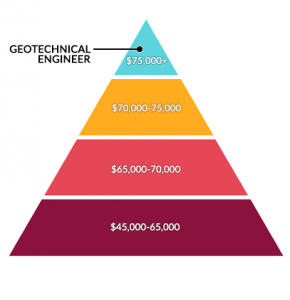All about Geotheta

A geotechnical designer is a specialized civil engineer who focuses on the habits of dirt, rock, and other products found underneath the Planet's surface. They use scientific principles and design methods to analyze the properties and habits of these products to sustain the risk-free and reliable design, building and construction, and maintenance of facilities tasks.
They carry out website examinations, collect samples, execute laboratory tests, and assess data to assess the suitability of the ground for building and construction projects - Geotechnical Engineers. Based on their findings, geotechnical designers give recommendations for foundation style, incline security, preserving frameworks, and mitigation of geotechnical risks. They work together with various other professionals, such as architects, structural designers, and construction teams, to make sure that geotechnical factors to consider are incorporated right into the total project design and implementation
By evaluating the habits and homes of soil and rock, they can determine prospective geotechnical dangers such as landslides, dirt negotiation, or slope instability. Their experience aids protect against failings or crashes that might threaten lives and residential or commercial property. Here are some detailed responsibilities and responsibilities of a geotechnical designer: Website Examination: Geotechnical designers conduct site examinations to gather data on subsurface problems.
They interpret the data to comprehend the properties and behavior of the soil and rock, including their stamina, permeability, compaction attributes, and groundwater problems. Geotechnical Evaluation and Style: Geotechnical engineers examine the information accumulated during website examinations to analyze the security and viability of the website for building and construction tasks. They execute geotechnical estimations and modeling to review variables such as bearing capability, settlement, slope security, side planet pressures, and groundwater flow.
Little Known Questions About Geotheta.
Foundation Layout: Geotechnical designers play a critical duty in creating foundations that can safely sustain the desired structure. They analyze the dirt conditions and lots requirements to determine the proper foundation kind, such as superficial foundations (e.g., footings), deep structures (e.g (https://www.behance.net/ianhammond2)., piles), or specialized methods like soil improvement. They consider factors such as negotiation restrictions, birthing capacity, and soil-structure interaction to create optimum structure styles
They evaluate construction strategies, screen site tasks, and perform field evaluations to validate that the layout suggestions are complied with. If unexpected geotechnical issues emerge, they examine the situation and give suggestions for remediation or changes to the style. Risk Assessment and Reduction: Geotechnical engineers analyze geotechnical threats and risks connected with the task website, such as landslides, liquefaction, or soil disintegration.

Cooperation and Interaction: Geotechnical designers function closely with various other experts associated with a task, such as designers, architectural engineers, and construction groups. Efficient interaction and partnership are vital to integrate geotechnical factors to consider into the total job design and building process. Geotechnical designers provide technological expertise, solution queries, and ensure that geotechnical demands are met.
Geotheta Things To Know Before You Buy
Here are some types of geotechnical designers: Structure Engineer: Foundation engineers concentrate on designing and assessing foundations for structures. They analyze the soil conditions, tons demands, and site features to establish the most suitable foundation type and style, such as superficial structures, deep foundations, or specialized methods like stack structures.
They evaluate the elements influencing slope stability, such as soil residential or commercial properties, groundwater conditions, and slope geometry, and develop techniques to stop incline failures and reduce dangers. Earthquake Engineer: Earthquake designers specialize in analyzing and designing structures to hold up against seismic pressures. They analyze the seismic threat of a website, evaluate soil liquefaction capacity, and develop seismic design criteria to make certain the safety and security and strength of structures during quakes.
They execute area testing, collect examples, and assess the accumulated data to define the dirt buildings, geologic developments, and groundwater conditions at a site. Geotechnical Instrumentation Designer: Geotechnical instrumentation designers concentrate on monitoring and gauging the habits of soil, rock, and frameworks. They mount and keep instrumentation systems that keep an eye on elements such as dirt negotiation, groundwater levels, incline movements, and architectural variations to evaluate efficiency and supply early cautions of prospective concerns.
The Buzz on Geotheta
They tend to be investigatory people, which means they're intellectual, reflective, and investigative. They wonder, systematic, rational, analytical, and rational. Several of them are additionally social, implying they're kind, generous, participating, person, caring, valuable, understanding, sensible, and pleasant. Does this audio like you? Take our free profession test to figure out if geotechnical designer is just one of your leading career matches.
In the workplace setting, geotechnical designers use specialized software application devices to do calculations, produce designs, and assess information. They prepare records, evaluation project specifications, connect with customers and staff member, and coordinate project activities. The workplace setup supplies a conducive environment for study, evaluation, and collaboration with various other experts associated with the project.
Some Ideas on Geotheta You Should Know
They often visit job sites to carry out website investigations, assess geotechnical conditions, and collect data for evaluation. These check outs entail traveling to various areas, often in remote or difficult surfaces. Geotechnical engineers might perform soil tasting, conduct tests, and screen construction activities to make certain that the geotechnical aspects of the job are being executed properly.
Geotechnical designers also function in specialized geotechnical research laboratories. In these centers, they perform experiments, do tests on soil and rock examples, and assess the design properties of the materials. Geotechnical lab designers function thoroughly in these environments, dealing with screening devices, running instruments, and tape-recording data. They team up with various other research laboratory staff to guarantee precise and reliable testing results.
Comments on “The Best Strategy To Use For Geotheta”